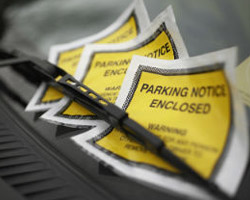What Are the Consequences of a Moving Violation?
How Is It Treated Differently Than Other Traffic Infractions?
 Traffic accidents cause, on average, more than 30,000 deaths and over 3 million injuries every year. For that reason alone, law enforcement agencies nationwide aggressively enforce traffic laws, particularly those referred to as moving violations. What is a moving violation, and what distinguishes it from other types of traffic offenses? What is the potential impact of conviction for a moving violation?
Traffic accidents cause, on average, more than 30,000 deaths and over 3 million injuries every year. For that reason alone, law enforcement agencies nationwide aggressively enforce traffic laws, particularly those referred to as moving violations. What is a moving violation, and what distinguishes it from other types of traffic offenses? What is the potential impact of conviction for a moving violation?
What Is a Moving Violation?
A moving violation is one that occurs while a vehicle is either in forward or backward motion, although offenses that are considered moving violations can vary from state to state. Moving violations are typically considered more serious than other types of traffic offenses—”nonmoving violations”—because the risk of injury increases significantly when a vehicle is in motion.
How Is a Moving Violation Charged or Prosecuted?
Depending on the circumstances and the specific violation, a moving violation may be considered an infraction, a misdemeanor, or a felony.
Moving Violations as Infractions—Consequences and Examples
A large number of moving violations are treated as infractions, with the penalty typically involving only a fine. As a technical matter, infractions:
- Are not criminal offenses
- Do not require that you appear in court
- Will not result in your being taken into custody
- Will not create or appear on any type of criminal record, and
- Will not typically add points to your driving record or cause an increase in insurance premiums.
Examples of moving violations that are commonly deemed to be infractions are:
- Equipment violations (while the vehicle is in motion), such as defective turn signals, taillights, headlights, horn, or muffler
- Most speeding tickets, unless the rate of speed rises to the level of reckless driving
- Running through a stop sign or traffic light
- Making a turn without signaling
- Making an improper lane change
- Failure to use due caution
- Not using a seat belt while operating a vehicle
Misdemeanor Moving Violations—Impact and Examples
Moving violations that are considered more serious than infractions are almost always charged as misdemeanors. If your violation is deemed to be a misdemeanor, you can expect greater consequences. A misdemeanor is a criminal offense and therefore may result in incarceration, in addition to any fines. For misdemeanors, the period of incarceration is generally capped at one year, and the sentence is almost always served in a city or county jail.
You can anticipate significantly higher fines if convicted of a misdemeanor moving violation. In addition to fines and potential jail time, you may be ordered to make restitution if your moving violation has caused property loss or other financial injury. In addition, there are some misdemeanor moving violations, such as DUI or DWI, that can carry an automatic suspension of your driver’s license. You may also be ordered to attend traffic school.
With a misdemeanor moving violation, there’s also a greater likelihood that you will add points on your driving record, which can lead to an increase in your insurance premiums. If you accumulate more than a certain number of points within a specified period, you risk suspension of your driving privileges. Those points will automatically drop off your driving record after a period of time, but you can also get rid of some points by attending approved driver education courses.
Examples of traffic violations that rise to the level of misdemeanor moving violations include:
- Operating a vehicle with a suspended or revoked license
- Operating a vehicle with an expired or suspended vehicle registration
- Operating a vehicle while intoxicated or impaired (DWI) or while under the influence of alcohol or drugs (DUI)
- Operating a vehicle with “wanton or careless disregard for the rights or safety of persons or property,” commonly referred to as reckless driving—Reckless driving is often tied to driving at an extremely high rate of speed, given the location and circumstances.
When Will a Moving Violation Be Charged as a Felony?
Though it’s rare, you can face felony charges for a moving violation. Traffic violations that may result in a felony charge include:
- Repeat or egregious drunk driving convictions
- Fleeing the scene of an accident (hit and run), particularly when you cause the collision and it leads to bodily injury or property damage
- Using a motor vehicle to evade or flee from law enforcement officers
- Some types of vehicular homicide
- Extreme levels of reckless driving, such as drag racing
If convicted of a felony moving violation, you can be sentenced to serve time in a state prison, and the period of incarceration may exceed one year. Furthermore, some states categorize certain misdemeanor moving violations as aggravated or gross, with penalties similar to those associated with felony convictions.
Connect with Top-rated Attorneys Near You
Sponsored Advertisement
Other Criminal Law Topics
Sex Crimes
Is There a Difference Between DWI and DUI Charges?
Criminal Justice System
An Overview of the American Juvenile Justice System
Crimes Involving Theft: Receipt of Stolen Property and Embezzlement
Bankruptcy Fraud
Credit Card Fraud
Crime Classifications and Definitions
Understanding Larceny and Other Types of Theft Offenses
Defenses to Crimes
Electronic Surveillance
Environmental Crimes
Understanding the Nature and Consequences of a Felony Charge
Forfeiture
Fundamental Rights of the Accused
Healthcare Fraud
Internet Fraud
Juvenile Programs
Misdemeanor Crimes
Other Criminal Law
Phone Fraud and Telemarketing Fraud
Search & Seizure Law
Search and Seizure
Status Offenses
Juvenile Court Procedures and Sentencing
White-Collar Crime—What It Is and How It Differs From Other Crimes
All Criminal Law Topics
Latest Article
What Is a Trust Fund? A Comprehensive Guide
A trust fund is a powerful tool that has stood the test of time. It is an essential instrument in modern wealth manageme... Read More
Arraignment: Meaning, Common Charges, & Process
Arraignment is a pivotal moment within the criminal justice system, marking the formal initiation of criminal proceeding... Read More
What Is Probable Cause? Definition and Examples
The Constitution protects you from being searched without a valid reason. But what exactly constitutes a valid reason? A... Read More
GETLEGAL®ATTORNEY DIRECTORY
Find Leading Attorneys in Your Area
NEED PROFESSIONAL HELP?
Talk to an Attorney
How It Works
- Briefly tell us about your case
- Provide your contact information
- Choose attorneys to contact you





